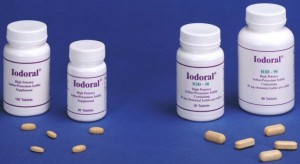“These are the most common nutritional deficiencies I see in my Orange, chiropractic and integrative medicine practice: Magnesium, Zinc, Vitamin D, Vitamin E, Omega 3 Fatty Acids (ALA, EPA, DHA) and Iodine (potassium Iodide). I personally feel that these deficiencies are not just representative of my local area but are a glimpse of what the world, in general, is experiencing. Below is a brief summary for each nutrient. I have come to this conclusion based on dietary analysis, clinical observation/correlation, blood and urine tests.” Marcus Ettinger BSc, DC

If you would like to purchase any of these products, please call us at (714) 639-6360. We can ship anywhere in the US and Canada.
1. Magnesium
Deficiency: 8 out of 10 clients show clinical signs of magnesium deficiency. The average American diet only contains 50% to 60% of the Recommended Daily Allowance (RDA). According to Dr. Guosong Liu, half the population of industrialized countries have a magnesium deficit, which increases with aging.
Symptoms: Anxiety, confusion, heart attack, hyperactivity (ADD/ADHD), insomnia, nervousness, muscular irritability (twitches, spasms or cramps), restlessness, Restless Leg Syndrome (RLS), weakness, heart palpitations, depression….
Recommended Foods: All green leafy vegetables (ex. Swiss chard and spinach), Seeds (pumpkin or sunflower seeds), Beans (black or navy beans).
Recommended Nutritional Supplements: Magnesium aspartate, glycinate or citrate (400 – 600 mg’s per day) OR Transdermal Magnesium Chloride (1 ounce rubbed over the body, per day).
2. Zinc
Deficiency: 7 out of 10 clients show clinical signs of deficiency.
Symptoms: Acne, ADD/ADHD, brittle nails, delayed sexual maturity, depression/apathy, diarrhea, eczema, fatigue, growth impairment, hair loss, high cholesterol levels, immune impairment, impotence, irritability, lethargy, loss of appetite, loss of sense of taste, low stomach acid (HCl), male infertility/abnormal sperm, memory impairment, night blindness, paranoia, white spots on nails, poor wound healing, psoriasis….
Recommended Foods: Calf’s liver, beef, mushrooms, spinach, green peas and pumpkin seeds.
Recommended Nutritional Supplements: Zinc Glycinate (50 – 100mg’s per day). Take with food, as zinc supplementation may cause nausea if taken on an empty stomach.
3. Vitamin D3 (cholecalciferol)
Deficiency: 10 out of 10 clients show deficiency (99.8% of all of my Labcorp, client blood tests have shown deficiency).
Symptoms: Allergies, auto immune diseases, burning sensation in mouth, cancer, diarrhea, insomnia, myopia, nervousness, osteoporosis, poor calcium utilization, rickets, scalp sweating, weight gain….
Recommended Foods: Cod liver oil, shrimp and eggs.
Recommended Nutritional Supplements: BEST VITAMIN D3 (cholecalciferol) PRODUCT: Liquid Vitamin D Forte by Biotics Research ($20 for 700+ drops. Each drop = 2,000 IU’s). Recommended dosage of emulsified Vitamin D3 (cholecalciferol) – (6,000 – 10,000 IU’s per day for adults and 2,000 IU’s for children above the age of five). Skin exposure to the sun, 15 minutes per day, is another great way to get adequate Vitamin D exposure. Note: living in southern California, I only take my Vitamin D3 during the months of October through the beginning of June. I surf a lot, and as soon as my wetsuit comes off and I can get 15 minutes+ of direct sunlight, I no longer need the supplement form. In fact, if I kept taking it, I would sunburn within 15 minutes. This is what your body does when the vitamin D3 level is maxed-out.
4. Vitamin E (d-alpha tocopherol)
Deficiency: 3/10 Males and 2/10 Females show signs of deficiency.
Symptoms: Neurological disturbances (gait disturbances, poor reflexes, loss of position sense, loss of vibration sense), shortened red blood cell life….
Recommended Foods: Green leafy vegetables (Mustard greens, chard, spinach and turnip greens), almonds and sunflower seeds.
Recommended Nutritional Supplements: d-alpha Tocopherol w/Mixed Tocohperols (400-800 IU’s per day) or Organic Cold Pressed Wheat Germ Oil (1 Tablespoon per day supplies 400IU’s of d-alpha tocopherol).
5. Omega 3 Fatty Acids (ALA, EPA, DHA)
Deficiency: 8/10 show signs of deficiency.
Symptoms: Diarrhea, dry skin and hair, hair loss, acne, eczema, psoriasis, immune weakness, infertility, poor wound healing, premenstrual syndrome, gall stones, liver degeneration, ADD/ADHD and Depression….
Recommended Foods: Flax seed and/or flax seed oil, walnuts, sardines and wild-caught salmon (Important: avoid farm-raised salmon! Eating farm raised salmon vs wild salmon increases your risk of being exposed to PCB’s, dioxin and other toxic pollutants. Farm raised salmon is colored with artificial color and lacks the omega 3 fatty acids of wild caught salmon).
Recommended Nutritional Supplements: Organic, Cold Pressed, Solvent Free – Flax Seed Oil (1 Tablespoon/10 grams per day – Best source of alpha-linolenic acid); Mollecularly Distilled Fish Oil (1 Teaspoon per day – Best source of EPA/DHA).
6. Iodine (potassium iodide)
Deficiency: 6/10 show signs of deficiency and/or therapeutic need.
Symptoms: See – Iodine and the Body & Iodine and Disease
Recommended Foods: Most Kelp or Kombu has about 2500 mcg/gm. Other common seaweeds are much lower; for example, Nori (16 mcg/gm), Wakame (32 mcg/gm), Dulse (72 mcg/gm), Hijiki (629 mcg/gm).
Shellfish is variable, but some typical amounts of iodine are: Prawns (21mcg/100 g), (60mcg/100 g), Mussels (140mcg/100 g), Lobster (100mcg/100 g), Shrimp (100mcg/100 g). For a complete list, pleas go to Iodine in Food.
Recommended Nutritional Supplements: Iodoral – 50mg’s per day for three months, then 12.5mg per day. Do not start on Iodine without first consulting your physician!
